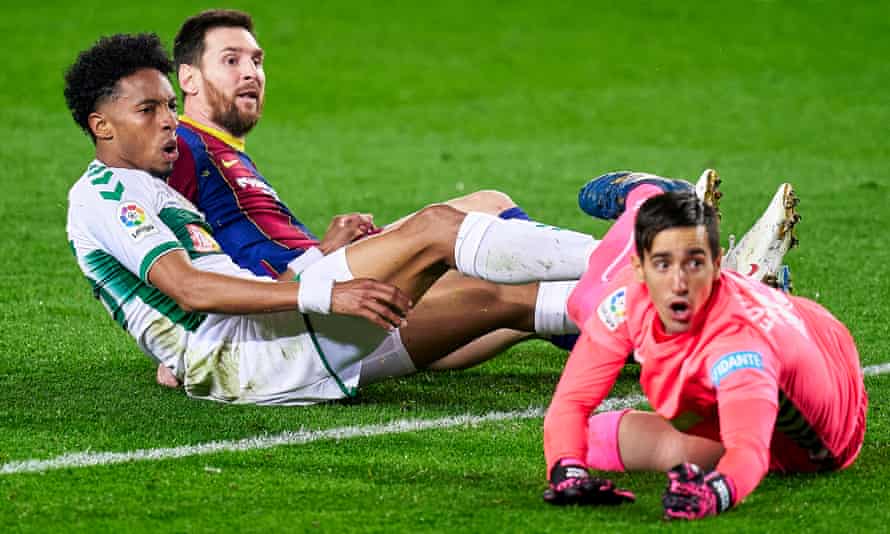Of all the many Elvis Presley incarnations – Vegas Elvis, Leather Elvis, Super-Handsome Young Elvis – my favourite is probably Karate Elvis.
Elvis loved karate. He often appeared in public dressed in karate gear, and spent years planning his own starring role in a karate-based blockbuster movie. The problem was, he kept on doing karate as he grew older and vaguer, encouraged by dependant body guards whose duties included humouring Elvis in the belief he remained a deadly fighting machine.
Even as late-stage Elvis was being wheeled from sleep chamber to toilet complex – occasionally gorging on his favourite snack, an entire loaf hollowed out and filled with bacon, peanut butter and jam – he retained his karate nickname, “the Tiger Man”.
As the Tiger Man he made a habit of appearing at odd times of day dressed in karate suit and sunglasses, insisting his guests point a gun at him so he could disarm them with his lightning-fast drugged-up hands. Naturally Elvis was able to achieve this every time, to awed applause from his dependents.
It was hard not to think about this, just a little bit, watching the opening 47 minutes of Barcelona against Elche on Wednesday night, as Lionel Messi strolled, skulked and generally ambled around the Camp Nou pitch.
This is, of course, a kind of heresy. Messi may be an ageing supernova, but he isn’t on the Karate Elvis spectrum. Even through a slough of despond at Barcelona he has more shots and more passes a game than any attacking player in Europe. He’s still a goal machine, with 13 in 13 games since the winter break. This is one seriously well-preserved 33-year-old.
Still, though, it is also Messi, an athlete who inspires the most exacting, protective feelings. Any sense of shrinking reach, the loss of those delicate illuminations, is a kind of agony. You can’t help looking, scanning for cracks in the icon.
Plus there’s the gloom, the deathliness of this Barcelona iteration, the heavy air around its dying star. This is one way of saying Messi spends a lot of time walking these days. And not even walking quickly. For much of the opening 47 minutes against Elche, Messi wandered around like a man strolling off to buy a sandwich.
Dark thoughts can intrude at times such as these. There is the continued suggestion the Messi Industrial Complex may be about to decamp to the Premier League, a signing that would, even at this late stage, overshadow everything in his eyeline.

Manchester City already have a beautifully high-functioning midfield and attack. But they are, it has been reported again, ready to hand a five-year £450m commitment to the most overwhelming presence in world football, unavoidably colouring the spectacle, the club’s entire modern identity.
The question keeps nagging away. How much of this late-stage Messi supremacy is simply star momentum, a supertanker on its final lap into port? The 4-1 defeat at home to Paris Saint-Germain last week was a shiver of something. Surrounded by younger, better organised opponents Messi wasn’t only outrun. He looked vulnerable. He looked touchingly exposed. How close are we to this being real?
Does it even matter? It has been suggested the most compelling reasons for signing Messi are extraneous things: the chance to become the men who signed The Man, for the club to reap the generational marketing rewards, the step-change in global status. These were some of the dark thoughts on Wednesday night.
At which point, the Event happened. In isolation it was no different from so many other Messi events, but this time around it came like a breaking wave. With 46 minutes on the clock and the score 0-0 Messi was still walking around. At 46:37 he gave the ball away and watched as Ousmane Dembélé ran to fetch it. At 46.50 he was literally standing still, looking vaguely interested as some other people took part in a football match.
Finally Pedri received the ball in midfield and Messi saw an angle. As the clock ticked to 47 minutes he ran to take the pass and turned to face the Elche goal. Freezeframe the moment, and it seems clear Messi knows what’s about to happen. Somehow he has found a weird little channel of space between the two defensive midfielders, Guti and Omenuke Mfulu. By 47.02 suddenly everyone is running backwards, chasing this ferrety figure in a rush of panic, like first responders hurtling towards a burning scout hut.
Josema the left-sided centre-back cracks first, sliding out in a full-length lunge. But Messi is gone, gliding past on parallel rails. The ball is released to Martin Braithwaite, who has that shared picture airdropped into his head and nudges the ball back. From there, Messi eases past Gonzalo, evades the run of Johan Mojica, and is now right in front of goal, stretching out to slip the ball past Édgar Badía as the clock hits 47:06.
From a standing start Messi has beaten five players, conjured a moment of footballing telepathy, left two defenders on their backs and scored the game-breaking goal. There he goes, wheeling off with a bashful little wave. Yeah, so that’s me. Wait, you didn’t … doubt me? Karate who?
The Fiver: sign up and get our daily football email.
Messi scored again on 68 minutes with a finish so brilliantly casual it made you want to laugh out loud, eventually placing the ball in the net like someone posting a letter. He helped make the third. You get the idea. He may be drained, irritated, energy levels dampened. But this is still The King.
All of which is another way of saying the thing that is always said. There is a temptation to worry away at what Messi can still mean. But if there’s a chance to get him you have to take it, because we may not see his like again.
from Football | The Guardian https://ift.tt/37RqIVl
via IFTTT

No Comment